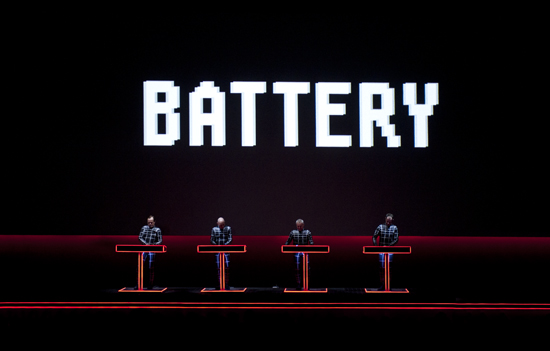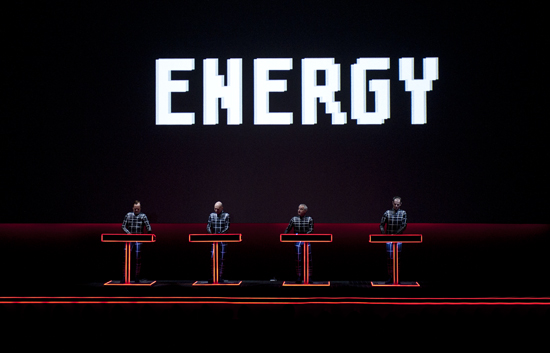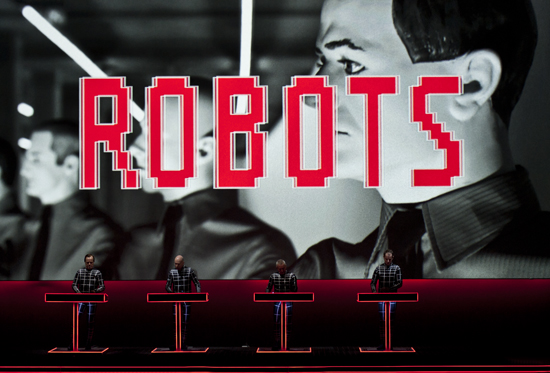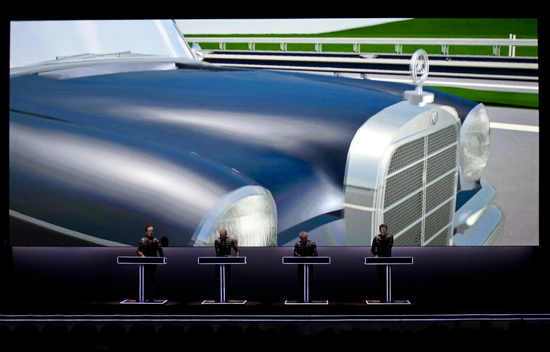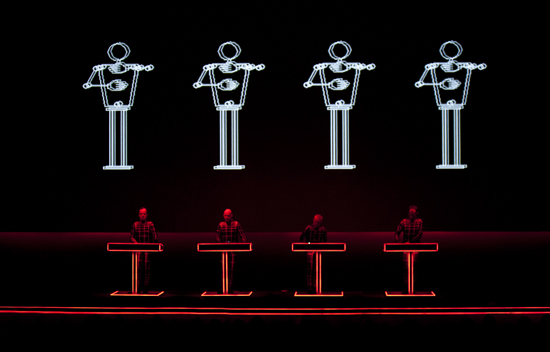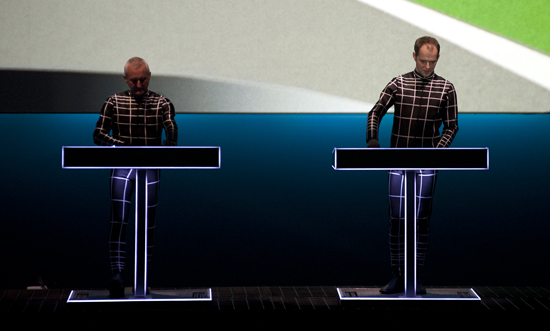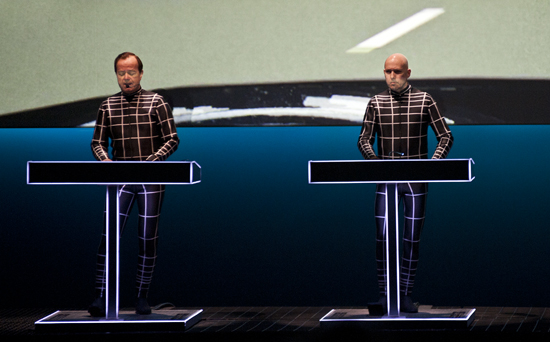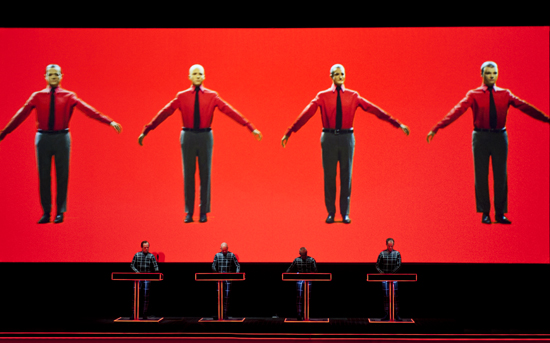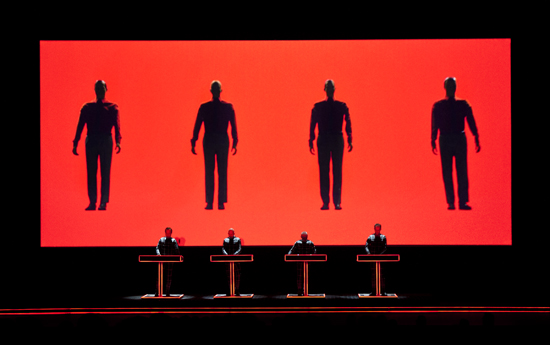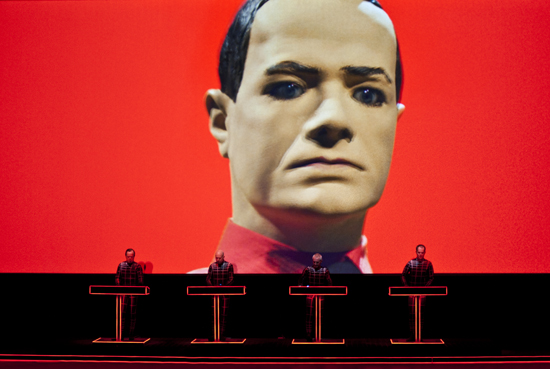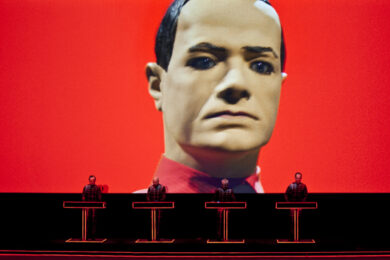Kraftwerk at Tate Modern as a Spotify playlist
As I step out of Waterloo train station heading for the South Bank, I am reminded not to allow the history of European conflict impinge on the live review I am on my way to write in any way shape or form. (Good natured ribbing about punctuality, efficiency and dry humour is completely acceptable however.) One only has to look through English language press cuttings concerning Kraftwerk over the years to realise that this is more difficult than it sounds. From Lester Bangs’ beery, lairy unpleasantness to NME‘s out-and-out racism concerning the group, it’s been a journalistic trope for a long time now.
As I round onto the South Bank I get my only guaranteed right as a Londoner – an unimpeded view of the majestic dome of St Paul’s Cathedral, standing silhouetted against the night sky as a symbol of British resilience during… "Vom Himmell Hoch!" I shout at the city skyline: "You’ll have to try harder than that if you want to catch me out!"
But there will be no tracks from -3, -2 or -1 tonight. I’m here with about 900 other faithful to watch a run through of what Kraftwerk refer to as album No. 1 aka Autobahn.
Rushing along the Thames the monolithic outline of the Tate Modern hoves into view. As is always the case when I’m on my way to a gig I am worried that there will be nothing for me to write about above and beyond listing what songs are played and what the musicians are wearing. I study the exterior of the huge former power station turned internationally renowned modern art gallery of immense repute while thinking in a panic: "I hope a strong image presents itself to me for my intro…"
As I enter the turbine gallery at exactly 21.00 the bells of St Paul’s toll nine times, while some other, less GMT-conscious City churches join in the tolling a few seconds late.
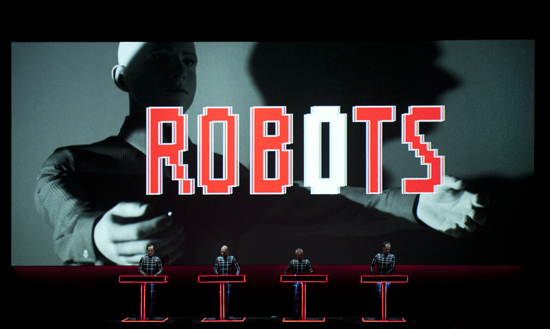
But this is not enough to confuse Kraftwerk who have synchronised their wrist watches with an atomic clock back at Kling Klang Two, their current studio situated eight miles outside of the beautiful city of Dusseldorf. Ralf takes to the stage in a sprightly manner along with the new guys, Cuthbert, Dibble and Gruber. At nine on the dot they start with ‘Robots’. They play this first thoughtfully so tardy Brits don’t miss any of the main event. (However this is Kraftwerk we’re talking about and the audience are one of the most respectful I’ve seen in the capital for a long time. Everyone’s in early, very few people talk during the set or film on phones; it’s almost like everyone gets that it’s a big deal.) The opening number is a machine funk maximised version and even though I’m on the wrong side of 18 stone and wearing brand new brogues on a one in eight inclined concrete floor, I risk some precisely considered dance moves. It’s impossible not to.
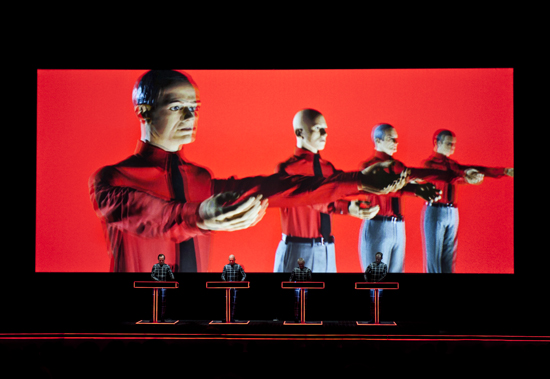
Then the vocoder intones the words we’ve all been waiting for: "Au-to-bahn".
There is a generous amount of playfulness in the song. Ralf all but gives us a cheeky wink. And this isn’t to downplay the historical significance of what he’s playing. If you wanted to you could make a strong case for this being the most important German song of the post war period. (I won’t as I have too many German friends who will just laugh at me and call me an idiot.) However you cannot deny the beauty of the immense narrative that the song has accrued over the years, or at least I can’t anyway.
In 1974 ‘Autobahn’ represented a metaphorical journey speeding the listener away from the recent past – a high velocity transit away from the horrors of Nazism and World War II. The German motorway network was inextricably linked with the dominance of the Nazis in the 1930s and early 1940s. The new roads provided links between all of the major cities in a manner that only previously been dreamed of. Hitler promised that he would eradicate unemployment and through the building plan he nearly achieved this goal. The middle classes had better transport links and the mercantile classes had an abundance of new markets that they were able to reach. And for Hitler himself he had achieved what he had always wanted: "Totale Mobilmachung" or total mobilisation for the troops of the Third Reich. By 1939 he was responsible for 3,000 km of new road.
It was part of his plan that as soon as the war was over people would be able to drive wherever they wanted in the Volkswagens he had promised to every family. It took a band as forward-looking as Kraftwerk to rescue the liberating nature of the autobahn back from the Third Reich. As soon as you hear the classic pop refrain "Wir fahr’n, fahr’n, fahr’n auf der autobahn" ("We are driving, driving, driving on the autobahn") you realise that Kraftwerk have won an important victory. The song is as much a riposte to the previous generation as it is a nod of respect to The Beach Boys and American road music. (The song makes explicit reference to ‘Fun Fun Fun’ by the Beach Boys, and it may or may not be coincidence that the rhythm to this refrain is that of ‘Barbara Ann’.)
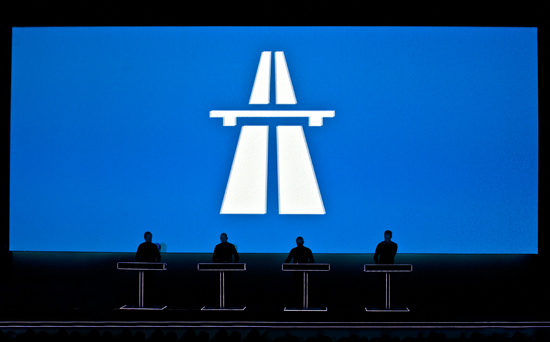
On the huge screen behind the four men, the Phillips 7" sleeve to the song has been animated from the P.O.V. of the driver of a VW. We see a hand reach for the dial on the radio. As the knob is turned, suddenly the track is stripped back to its vocal harmonies, paying even further tribute to the Beach Boys.
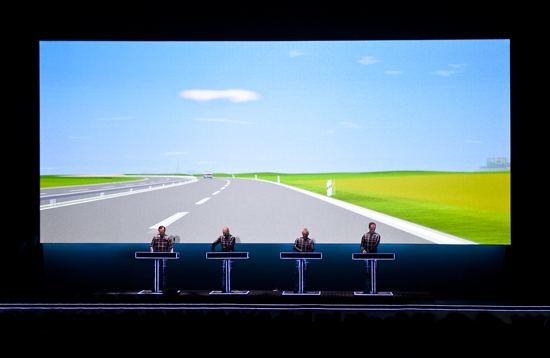
I take out all of my folding money and wave it in the air over my head as a tribute to the band’s first American tour when the majority black audience at the Detroit gig showed their appreciation in a locally acceptable fashion, apparently terrifying the quartet until someone later explained it was a sign of respect. (However a security guard looks at me like I need medical assistance, so I stop.)
Either way, it must be said that tonight Kraftwerk are the fucking money.
Their sound engineering team deserve electro knighthoods. Make all of them MBEs: Members of the Boing Boom Tschak Empire. This most unforgivingly sharp and bright of rooms with its thousands of feet of exposed corners and right angles tonight sounds like the Royal Albert Hall or the Barbican. Just momentarily during ‘Autobahn’ does the audio slip for a couple of seconds. Long enough for you to visualise massive breezeblocks of bass, beats and synths careering into one another in an appallingly unpleasant audio pile up. As it is they use the giant interior to their advantage in a playful manner letting all of the songs many sound effects fly round the room. I swear I see one person duck and it’s because not because of the 3D glasses that everyone’s wearing.
The film that accompanies Kometenmelodie features an animation of Haley’s comet travelling languidly from right to left across the screen over the length of the track. The point is clear; this is an event worth waiting for, worth celebrating.
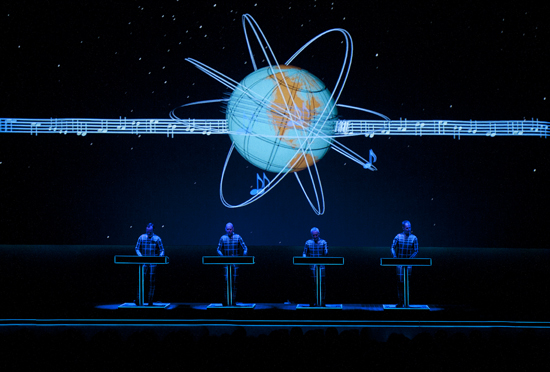
The more space the songs have this evening, the better they are. The vocoder at the beginning of ‘Geiger Counter’ is the most pristine thing I’ve ever heard, instigating the kind of shivery, full-spine rush that one would normally associate with narcotics. I can almost hear a room full of eyeballs dilating. The only song that really falls flat tonight is ‘The Model’ which is kind of tossed out there in a derisory manner, possibly understandable if it still remains the only song they’re popularly known for among the general public of many countries. It’s completely flat and unengaging but by the same token, ‘Neon Lights’ sounds like God’s own ringtone.
They play ‘Computer Love’ with the lyrics, "I call this number/ For a data date/ I don’t know what to do/ I need a rendezvous" flashing up on the screen, presumably as an apology to all those who couldn’t get tickets but still ended up with RSI for their troubles.
The good points about tonight are so utterly good that I feel almost embarrassed to gripe about any aspect of the show. Perhaps I should say that not as many of the versions are as reworked as I’d like them to be. (And I mean reworked from more recent live versions that is, rather than the originals). However those that are, ‘Autobahn’, ‘Kometenmelodie’, ‘Spacelab’, ‘Trans Europe Express’ and ‘Radioactivity’ are exceptional.
This live report is a first night sketch… more along the lines of an extended caption to go with Katja’s fantastic pictures, for those who want something more considered I’m going to write a feature length essay after I’ve been to see all the shows in the series. Still if I’ve upset anyone by being daft in this review let me end by saying something slightly more serious. As someone with no particular spiritual belief system, music and art are the most analogous things I have to religion; and watching this band in this building is as close to a literal religious experience as I’m likely to have while completely sober.
Setlist
The Robots
Autobahn
Kometenmelodie 1
Kometenmelodie 2
Mitternacht
Morgenspaziergang
Geiger Counter
Radioactivity
Trans-Europe Express
Spacelab
The Model
Neon Lights
The Man-Machine
Numbers
Computer World
Computer Love
Home Computer
It’s More Fun to Compute
Tour De France
Tour De France (Soundtracks)
Vitamin
Planet of Visions
Boing Boom Tschak
Techno Pop
Musique Non Stop
